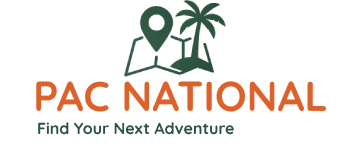How to Become a Travel Guide and Turn Your Passion into a Profession
Do you dream of a career filled with travel and adventure? Becoming a travel guide offers an exciting path, but requires careful consideration. This comprehensive guide explores the essential skills, qualifications, and pathways to becoming a successful travel guide. Discover the realities of the job, from managing diverse groups and handling unexpected situations to the importance of strong communication and adaptability. Explore training opportunities, specializations, and the evolving travel landscape. Start your journey towards a rewarding career as a travel guide today!
Important information

- A passion for travel and sharing experiences is fundamental for a fulfilling career as a travel guide.
- Excellent communication, interpersonal, and organizational skills are crucial for engaging diverse groups, managing logistics, and handling unexpected situations.
- Aspiring guides should research daily responsibilities, including long hours and physical demands, and consider the emotional toll of the job.
- Gaining practical experience through volunteering, internships, and certifications enhances career prospects.
- Staying current with industry trends, continuing education, and joining professional associations are vital for career advancement.
Deciding to Become a Travel Guide
Dreaming of a career as a travel guide? It’s an exciting path, but consider these points before taking the leap.
Self-Assessment
Do you genuinely love traveling and sharing your experiences? This passion is crucial for a fulfilling career. Are you a people person with excellent communication skills? Connecting with diverse groups is essential. Can you adapt to unexpected situations and handle pressure? Flexibility and resilience are key in this role.
Job Realities
Research the daily responsibilities. Be prepared for long, irregular hours and physical demands like walking and standing. Consider the emotional toll. Interacting with diverse individuals and handling unforeseen challenges requires resilience. Reflect on your personality and skills. Evaluate if you can thrive in a dynamic and demanding environment.
Evaluate your passion for travel and sharing experiences. It’s the foundation of a rewarding career as a travel guide.
Assess your communication and interpersonal skills. Engaging with diverse groups is paramount in this role.
Consider your adaptability and resilience. Unexpected situations and challenges are part of the job.
Research the day-to-day responsibilities. Understand the physical demands and long, irregular hours involved.
Reflect on the emotional toll. Interacting with people from all walks of life can be both rewarding and challenging.
Assessing Your Passion for Travel
Do you have a passion for exploring new cultures and places? A love for travel is essential for any happy travel guide. Reflect on your past adventures. Did you enjoy uncovering hidden gems and learning about different customs? If travel ignites your curiosity and thrills you, guiding might be your calling. Sharing travel stories is a big part of the job—enthusiasm is contagious! A passionate guide can transform a simple trip into an unforgettable experience.
Understanding the Role and Responsibilities
Travel guides lead exciting tours for individuals and groups, offering insightful commentary on cultural, historical, and geographical points of interest. They expertly handle all logistical details, ensuring a smooth and enjoyable trip for everyone. Their deep destination knowledge is crucial, as are excellent communication skills. Adaptability is essential, allowing them to handle unexpected issues with a customer-focused approach.
Specializations
Some guides specialize in adventure tourism, while others focus on cultural or historical expeditions.
Employment
While some work independently, many are employed by tour operators, cruise lines, or other travel-related companies.
Travel guides strive to create memorable and positive travel experiences.
Evaluating Personal Skills and Attributes
A great travel guide needs a specific skillset. Excellent communication is essential for connecting with people. Strong organizational abilities are crucial for managing logistics and handling unforeseen problems. Flexibility is key, as travel plans are fluid. A passion for continuous learning is also vital, keeping your knowledge as dynamic as the world itself.
Choosing Your Guiding Style
When choosing your guiding style, consider your preferences. Do large groups energize you, or do you prefer the intimacy of smaller tours? Perhaps a specialization, like adventure or cultural tours, appeals to you. The possibilities are extensive.
Reflecting on Your Experiences
Reflect on your past experiences. Have you successfully organized events, led teams, or resolved conflicts smoothly? These experiences demonstrate the skills necessary for guiding. This self-reflection will help determine if you have the qualities of a successful travel guide – a truly exciting career for the right individual.
Essential Qualifications and Skills for Travel Guides
Aspiring travel guides typically need a high school diploma and superb communication skills to clearly convey information and engage diverse groups. Interpersonal skills are crucial for building rapport with travelers and fostering positive group dynamics. Exceptional organizational skills are essential for managing itineraries, bookings, and logistics.
- first aid and CPR certifications are beneficial,
- a solid understanding of local history, culture, geography, and attractions allows guides to offer informative tours,
- adaptability and flexibility are key to catering to individual needs.
Problem-solving abilities help navigate unexpected situations, ensuring smooth travels. Knowing another language is a valuable asset, and prior customer service experience enhances service delivery and expectation management.
Educational Requirements and Certifications
While a high school diploma is usually enough for most tour guide jobs, a college degree isn’t always required. However, specialized roles, especially those focused on history, art, or tourism management, often prefer candidates with a bachelor’s degree. You can boost your career prospects with relevant certifications like wilderness first aid, cultural heritage interpretation, or sustainable tourism practices. These not only show your commitment but also make you more appealing to employers and potential clients.
Communication and Interpersonal Skills
Effective communication is essential for travel guides. It allows them to inform and engage diverse groups, clearly explaining information and effectively answering questions. Adapting their communication style to different audiences is also crucial. Strong interpersonal skills are equally important, helping guides build rapport with travelers by being approachable and empathetic. Connecting with people from various backgrounds creates a positive and memorable tour experience. These skills are fundamental to a guide’s success.
Communication Skills
- clearly explains information,
- effectively answers questions,
- adapts communication style to different audiences.
Interpersonal Skills
- builds rapport with travelers,
- demonstrates approachability and empathy,
- connects with people from diverse backgrounds.
Organizational and Problem-Solving Skills
Exceptional organizational skills are crucial for travel guides. They manage complex itineraries, transportation logistics, and accommodation arrangements. Problem-solving is also essential, as unexpected issues, such as flight delays or medical emergencies, can arise. However, skilled guides ensure smooth and enjoyable trips by expertly handling these situations. Travel guides possess strong organizational skills, enabling them to manage detailed itineraries, transportation, and accommodations. Their problem-solving abilities are invaluable when unforeseen issues like flight delays or medical emergencies occur. Skilled guides expertly handle these challenges, ensuring seamless and enjoyable travel experiences.
Key Skills of a Travel Guide
- Exceptional organizational skills to manage complex itineraries, transportation logistics, and accommodation arrangements.
- Excellent problem-solving abilities to address unforeseen issues like flight delays or medical emergencies.
Benefits of Hiring a Skilled Travel Guide
- Seamless and enjoyable trips thanks to expert handling of unexpected challenges.
- Stress-free travel experience, allowing travelers to relax and focus on enjoying their journey.
Knowledge and Storytelling Ability
Expert travel guides offer extensive knowledge about their region’s history, culture, and attractions. Their engaging storytelling brings destinations to life, making information memorable and enriching the travel experience.
Pathways to Becoming a Travel Guide
Aspiring travel guides can explore several career paths. Formal training and certification programs provide a strong base. Volunteering at museums, historical sites, or visitor centers offers practical experience. Internships with tour operators or travel agencies give structured training. Specializing in a niche like adventure tourism, cultural tours, or ecotourism can be advantageous. Career options include working with tour companies, cruise lines, or becoming a freelance guide.
Enroll in a tour guide training and certification program to gain a solid foundation.
Gain practical experience by volunteering at museums, historical sites, or visitor centers.
Pursue internships with tour operators or travel agencies for structured training.
Consider specializing in a niche area like adventure tourism, cultural tours, or ecotourism to stand out.
Explore diverse career options, from working with established tour companies or cruise lines to becoming an independent freelance guide.
Tour Guide Training and Certification
Aspiring tour guides can greatly benefit from training programs that equip them with essential skills, from local history and customer service to the intricacies of tour operations. Earning certifications not only validates their expertise but also enhances job prospects within the tourism sector. Many programs incorporate first aid and CPR training, sometimes as a requirement, sometimes as a recommendation. Some programs specialize in sustainable tourism practices, while others focus on specific regions or tour types. Before embarking on a program, research your destination’s licensing requirements, as some regions mandate specific permits for tour guides.
Benefits of Training Programs
- Improved knowledge of local history, customer service, and tour operations.
- Enhanced job prospects with validated expertise.
- Acquisition of essential first aid and CPR skills.
Program Focus and Considerations
- Specializations in sustainable tourism, regions, or tour types.
- Varied approaches to first aid and CPR training (requirement vs. recommendation).
- Importance of researching destination-specific licensing requirements.
Gaining Experience through Volunteering and Internships
Gain valuable experience as an aspiring travel guide through volunteering or internships. Volunteering at local tourist attractions provides hands-on practice leading real tours. Internships offer structured training and networking opportunities. Both options strengthen your resume and build essential skills for a successful travel guiding career.
Volunteering
Gain hands-on experience leading tours at local tourist attractions.
Internships
Receive structured training and valuable networking opportunities.
Both volunteering and internships strengthen your resume and build essential skills for a successful career in travel guiding.
Choosing a Travel Niche and Career Path
Becoming a successful tour guide involves several key steps:
Choose a niche. Select a specialization that aligns with your interests, such as adventure tourism, cultural guiding, or eco-tourism.
Gain practical experience. While formal training is beneficial, hands-on experience through volunteering or internships is crucial for developing essential skills.
Network strategically. Connect with fellow guides and industry professionals to expand your network and discover new opportunities.
Build a strong portfolio. Showcase your abilities and attract clients by creating a compelling portfolio that highlights your experience and expertise.
Promote yourself effectively. Actively promote your services to reach potential clients and establish your presence in the industry.
Specialize further. Focus on a specific area of expertise, such as birdwatching tours or historical city walks, to attract a niche clientele.
Cultivate your reputation. Gather client testimonials and online reviews to build credibility and demonstrate your skills and experience.
Opportunities and Challenges in a Travel Guide Career
A career as a travel guide offers exciting prospects in the booming tourism industry. The World Travel & Tourism Council forecasts 5.8% annual growth, so the field is ripe with opportunity. However, it also presents unique challenges. Managing diverse customer needs and ensuring satisfaction is paramount. Adaptability is also key, especially given the rise of sustainable tourism and the need for eco-conscious practices. Furthermore, the COVID-19 pandemic has shifted traveler preferences toward personalized experiences, impacting the guide’s role. A bright future awaits those who embrace change and adapt to evolving demands.
Opportunities
- Booming tourism industry with projected growth.
- High demand for personalized travel experiences.
- Chance to contribute to sustainable and eco-conscious tourism.
Challenges
- Managing diverse customer needs and ensuring satisfaction.
- Adapting to evolving traveler preferences post-pandemic.
- Staying updated on sustainable tourism practices.
Understanding the Job Outlook and Trends
The travel and tourism industry is experiencing a resurgence, creating a high demand for skilled travel guides. This career path offers excellent prospects as travelers increasingly seek authentic and unique adventures. This trend has fueled the growth of specialized tours and personalized itineraries, making guides with niche expertise highly sought after. Adventure tourism, cultural heritage, and ecotourism are particularly popular areas. The rising interest in sustainable and responsible travel further expands opportunities for guides to share their knowledge of local communities and environments. This creates a rewarding career path for those passionate about travel, culture, and environmental preservation.
Managing Customer Satisfaction and Expectations
Happy customers are essential for business success.
Clear communication is key to customer satisfaction, especially when addressing concerns promptly.
Effective travel guides anticipate potential problems and proactively offer solutions.
A positive attitude, combined with attention to individual needs, consistently exceeds customer expectations.
Gathering feedback is crucial for improving future tours and maintaining high customer satisfaction.
Adapting to Travel Trends and Experiences
The travel guide profession is constantly evolving. To thrive in this dynamic field, guides must embrace new trends and anticipate traveler needs. Staying up-to-date is crucial, particularly with emerging destinations, exciting activities, and technological advancements. Flexibility is essential for navigating unforeseen circumstances like weather disruptions or flight delays, allowing guides to adjust itineraries seamlessly. The rise of sustainable tourism and the demand for personalized experiences highlight the importance of technology for bookings and information access.
Essential Skills for Modern Travel Guides
- Embrace new trends and anticipate traveler needs.
- Stay up-to-date on emerging destinations, exciting activities, and technological advancements.
- Be flexible in navigating unforeseen circumstances.
Gaining Experience in the Travel Industry
- Pursue internships and volunteer with tourism organizations.
- Assist established travel professionals.
- Network with other professionals and attend workshops.
Advancing Your Career as a Travel Guide
Staying current is crucial for travel guides. Enhance your skills with professional development courses focusing on customer service, risk management, and emerging technologies. Joining a professional association offers invaluable networking and resources. Consider these options:
- National Tour Association (NTA).
- World Federation of Tourist Guide Associations (WFTGA).
- Regional organizations, such as the European Federation of Tourist Guide Associations (FEG).
These platforms provide training programs, conferences, industry publications, and connections with seasoned professionals. Regional organizations promote best practices and facilitate communication among guides, upholding high standards within their respective areas.
Continuing Education and Professional Associations
Continuing education is vital for travel guides to stay ahead in the ever-evolving tourism industry. It allows them to keep pace with emerging trends, changing local regulations, and shifting customer expectations. Professional organizations offer invaluable support, providing networking opportunities, training resources, and crucial industry insights. They also empower guides to refine their skills, connect with fellow professionals, and access valuable career development tools. Here are some key organizations that support travel guides:
- National Tour Association (NTA): this association offers numerous resources for tour operators and travel professionals, including networking events, educational programs, and industry updates.
- European Tour Operators Association (ETOA): focused on the European travel market, ETOA provides advocacy, training, and business opportunities for its members.
- World Federation of Tourist Guide Associations (WFTGA): representing tourist guides globally, WFTGA promotes best practices, offers training programs, and connects guides worldwide.
Staying current with industry knowledge and trends is essential for success in this dynamic field.
Exploring Freelance Work and Starting Your Own Business
Freelancing offers tour guides the flexibility to control their schedules and choose their tours. Starting a tour guiding business empowers entrepreneurs to craft unique travel experiences using their expertise and catering to specific interests. For example, niche tours can focus on history, food, adventure, or cultural themes.
Planning and Leading Tours Effectively
Crafting a memorable tour starts with a well-crafted itinerary that balances structured activities and free time, catering to everyone’s interests. Engaging experiences are paramount, immersing travelers in local culture, historical sites, and unique attractions.
Essential Skills for Tour Operators
- strong communication,
- problem-solving to manage unexpected hiccups,
- ensuring client satisfaction.
Building rapport with participants enhances the experience, while regular feedback refines future tours.
Effective Marketing Strategies
- establish a professional online presence (website and social media),
- showcase your expertise and connect with potential clients,
- network within the industry,
- offer promotional tours to build a loyal client base.
















